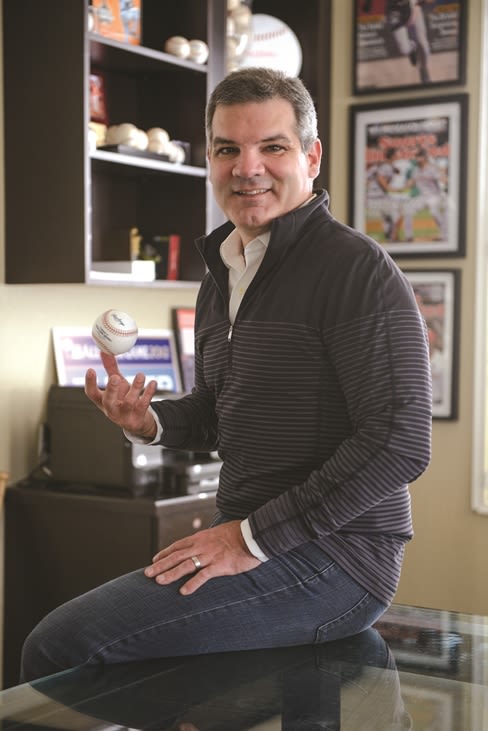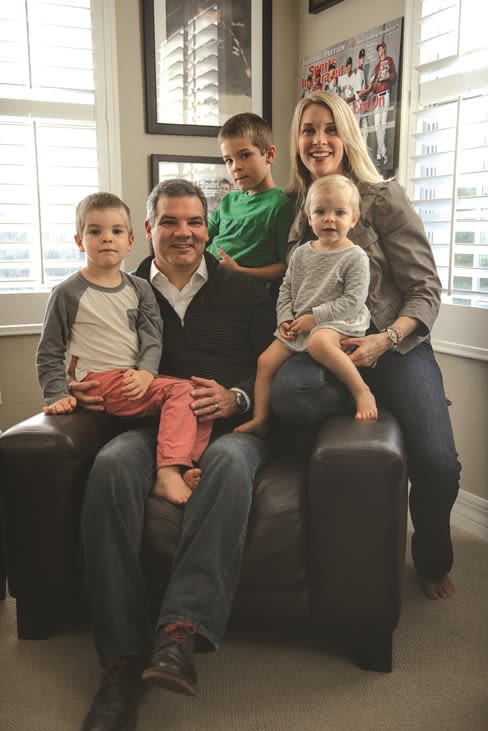Hardball
By Hannah Wallace
Photography by Chris Lake

JEFF BERRY IS NOT THE FAST-TALKING SLICKSTER you’d imagine a high-powered sports agent to be. Berry, who in 2013 negotiated a record-breaking $167 million Major League Baseball contract, is also a down-to-earth family man with a disarming smile and a friendly, comfortable manner. From his east Manatee County home, dressed in jeans and a polo shirt, the boyish Berry could pass as the manager of a successful sporting goods store.
Except that, as co-head of Creative Artists Agency’s baseball division and an outspoken, sometimes hard-nosed advocate for his clients, Berry spends 140 days of the year flying out of Sarasota or Tampa to baseball destinations all across the country, and his phone is jam-packed with contact info for some of the biggest names in the Majors, including the Orioles’ Gold Glove-winning Adam Jones, the ex-Rays’ Rookie of the Year Wil Myers, and Buster Posey, the San Francisco Giants’ all-star catcher who just won his third World Series in five years.
In fact, it was Posey who signed the record-breaking, nine-year, $167 million contract that Berry negotiated for him in 2013. And to those who complain that athletes like Posey are overpaid, Berry has an explanation.
“Most [baseball] careers don’t extend into people’s 40s,” Berry says. “It’s critical to maximize the earnings for these players who have dedicated their lives to this profession.” Berry has dedicated his 16-year career to maximizing baseball players’ earnings, and the hits keep right on coming.
Born in Owensboro, Ky., Berry played baseball at the University of North Carolina at Charlotte and then spent one year as a catcher in the Boston Red Sox minor league system. Sensing little potential in his pro ball career, he enrolled in the Oklahoma City University Law School, where, in 1998, he graduated cum laude with his juris doctor.
But it was his position there as a graduate assistant baseball coach that propelled him toward his future career.
“They’d have Christmas camps, and all these pro [coaches and MLB veterans] in the area, I got to know them,” he says. “Vern Ruhle was a very good Big League pitcher and then a pitching coach for a number of years. He told me, ‘Hey, [being an agent] is something I think you should get into.’” Berry leveraged those earliest contacts to learn about player representation and eventually recruit his first clients.
“Today, the young kid that we hire out of college knows every deal I’ve ever done,” he says. “But in the mid-1990s, the Internet wasn’t [in widespread use]. There was no information on how to go about getting into this business. It was just by good fortune.”
After spending some time with IMG’s headquarters in Ohio, Berry came to Bradenton in 2001 to operate his own office out of the IMG Academy campus, where a number of professional athletes train. There he met Sarah, a Bradenton native (her father, Dr. Paul May, ran a Manatee Avenue veterinarian office for many years). The two wed in 2005. In 2006, Berry joined CAA Sports’ New York office, co-founding its baseball division.
The family lived in New York, until their second child was born in 2010. They decided to move back to Bradenton, where Sarah’s family could provide support, especially when Berry is on the road. “I love living east of the interstate,” says Berry. “I can get to the Tampa airport in 45 minutes, to Sarasota in 20. It’s an easy commute to New York. [Living here] is a lifestyle much more than a job. It’s lovely down here.”
“People don’t understand the mental grind.”
Representing clients is all about personal connection, and that connection starts early—especially with baseball players, who may turn professional as teenagers. “I remember meeting with Wil Myers’ family when he was 17 years old. I remember meeting with Buster Posey [at 20] and his family for the first time at a Cracker Barrel in Tallahassee,” Berry says.
Berry’s first job is to translate the player’s needs and goals into a contract, while navigating the collective bargaining agreement (CBA) between the league and the players union, which dictates everything from minimum salary to trade clauses to drug testing.
“It’s important for a player to recognize what level of competency an agent has with regard to the things that matter in his career,” says Berry. “It is a personal-connection business, but it can’t be all personal. When you’re going through a contract negotiation, there are always difficult decision-making points, regardless of the amount of dollars at play. You have to have a mutual trust when going through that sort of life-defining moment; you want to maximize the players’ opportunities, to accomplish what their goals are.”
Money is, of course, a big factor in a contract, but it’s not the only one.
“There’s the total dollar value, the number of years, the tax structure. Then there are various ancillary aspects—a bonus structure, an awards structure, a performance-based structure. It can go in a million different directions, from a full no-trade provision to a suite on the road,” he explains. “It’s all what is most important to a particular player.”
During negotiations with a team, Berry emphasizes his client’s upside, which might involve intangible qualities as well as talent. “Whatever makes that player valuable is something that you need to be able to articulate and properly communicate to a team,” he says. “Stats are important, but so is the core of who that person is, what he means to the team, and what he means in the clubhouse as well as on the field.”
Signing the contract is just the beginning. Berry, who charges a standard contract-management fee per client (the MLB standard is around 4 percent to 5 percent, according to Forbes), works with a team of 20 in CAA Sports’ baseball division to make sure clients can handle anything that comes up—whenever and whatever it may be.
He says, “On a day-to-day basis, I’m dealing with what a particular player has going on within his organization: Are there injury concerns? Are there player development concerns? There’s obviously the marketing aspects of the athlete.”
Then there are the more unusual requests, like when a player called asking for help in tracking down a $15,000 breed of bulldog.
Throughout a grueling 162-game season, including road trips that can span the continent, just about anything can happen. “People don’t understand the mental grind; it’s the highest level of pure competition there is,” says Berry. “We try to provide very talented players with a support system that gives them every opportunity to succeed.”
Sometimes that support extends to advocating for rules changes. In 2011, Buster Posey suffered a season-ending leg fracture after what was at the time a legal (but brutal) collision at home plate. Berry, a former catcher, pressured the MLB to alter its rules to lessen the frequency and destructiveness of home plate collisions, which had long been a part of the sport. “There was no other position that I could think of in any sport where a grown man could run unimpeded for 90 feet into a defenseless player,” he argues.
In 2014, a new rule restricted the ways in which catchers could block the plate; many players—including some catchers—as well as commentators and fans griped about the change, but Berry supports it. “I think [this new rule] is better for the game,” he says. “I know some people disagree. But when Buster was injured the way he was, the game wasn’t better for it.”
And, he adds, “You didn’t see any catchers destroyed at home plate [last] year.”

Over time, many clients become family. Berry first met with pitcher Mark Buehrle and his parents in the living room of their St. Charles, Mo., home in 1999. Buehrle went on to win a World Series, pitch a perfect game and appear on a Wheaties box during his now 15-year career, all with Berry by his side. “We vacation with the Buehrles,” says Berry. “It’s much more than a client relationship. You become intertwined [with your clients’] lives and careers.”
Such relationships, he says, can make the money seem secondary. “The high watermarks for me aren’t the biggest contracts,” he says. “It’s when you see a guy that you’ve known since he was a kid get his first contract or make his first All-Star Team—and to know that you’re a small part of it.”
Berry credits perseverance—and a little luck—for his success. People he knew who started their baseball careers when he did are now higher-ups for a number of teams, helpful connections to have. But for aspiring agents, Berry says the bottom isn’t a bad place to start. “The key is getting your foot in the door, regardless of what entry-level position it is,” he says. The current general manager for the Toronto Blue Jays, he points out, started there working for free opening fan mail.
“If I could choose any job to do in the world, it would be the one I have,” he says. “And I know how lucky I am to be able to say that.” ■